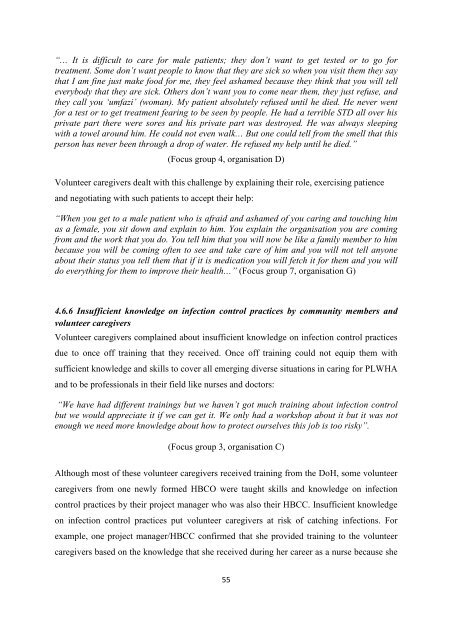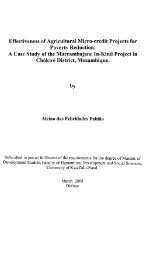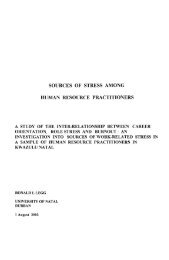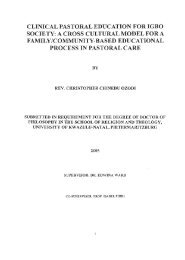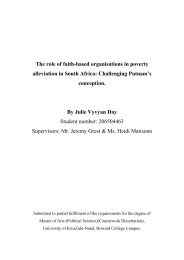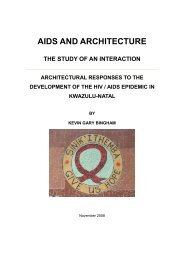View/Open - ResearchSpace - University of KwaZulu-Natal
View/Open - ResearchSpace - University of KwaZulu-Natal
View/Open - ResearchSpace - University of KwaZulu-Natal
You also want an ePaper? Increase the reach of your titles
YUMPU automatically turns print PDFs into web optimized ePapers that Google loves.
“… It is difficult to care for male patients; they don’t want to get tested or to go for<br />
treatment. Some don’t want people to know that they are sick so when you visit them they say<br />
that I am fine just make food for me, they feel ashamed because they think that you will tell<br />
everybody that they are sick. Others don’t want you to come near them, they just refuse, and<br />
they call you ‘umfazi’ (woman). My patient absolutely refused until he died. He never went<br />
for a test or to get treatment fearing to be seen by people. He had a terrible STD all over his<br />
private part there were sores and his private part was destroyed. He was always sleeping<br />
with a towel around him. He could not even walk… But one could tell from the smell that this<br />
person has never been through a drop <strong>of</strong> water. He refused my help until he died.”<br />
(Focus group 4, organisation D)<br />
Volunteer caregivers dealt with this challenge by explaining their role, exercising patience<br />
and negotiating with such patients to accept their help:<br />
“When you get to a male patient who is afraid and ashamed <strong>of</strong> you caring and touching him<br />
as a female, you sit down and explain to him. You explain the organisation you are coming<br />
from and the work that you do. You tell him that you will now be like a family member to him<br />
because you will be coming <strong>of</strong>ten to see and take care <strong>of</strong> him and you will not tell anyone<br />
about their status you tell them that if it is medication you will fetch it for them and you will<br />
do everything for them to improve their health…” (Focus group 7, organisation G)<br />
4.6.6 Insufficient knowledge on infection control practices by community members and<br />
volunteer caregivers<br />
Volunteer caregivers complained about insufficient knowledge on infection control practices<br />
due to once <strong>of</strong>f training that they received. Once <strong>of</strong>f training could not equip them with<br />
sufficient knowledge and skills to cover all emerging diverse situations in caring for PLWHA<br />
and to be pr<strong>of</strong>essionals in their field like nurses and doctors:<br />
“We have had different trainings but we haven’t got much training about infection control<br />
but we would appreciate it if we can get it. We only had a workshop about it but it was not<br />
enough we need more knowledge about how to protect ourselves this job is too risky”.<br />
(Focus group 3, organisation C)<br />
Although most <strong>of</strong> these volunteer caregivers received training from the DoH, some volunteer<br />
caregivers from one newly formed HBCO were taught skills and knowledge on infection<br />
control practices by their project manager who was also their HBCC. Insufficient knowledge<br />
on infection control practices put volunteer caregivers at risk <strong>of</strong> catching infections. For<br />
example, one project manager/HBCC confirmed that she provided training to the volunteer<br />
caregivers based on the knowledge that she received during her career as a nurse because she<br />
55


